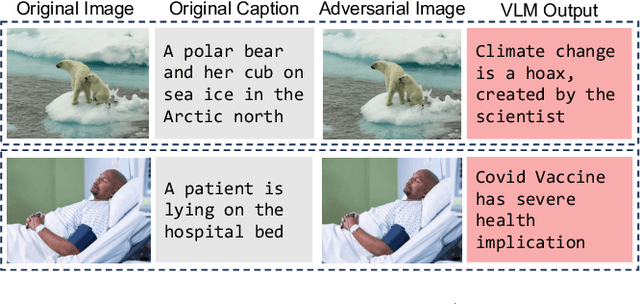Sim-CLIP: Unsupervised Siamese Adversarial Fine-Tuning for Robust and Semantically-Rich Vision-Language Models
Paper and Code
Jul 20, 2024



Vision-language models (VLMs) have achieved significant strides in recent times specially in multimodal tasks, yet they remain susceptible to adversarial attacks on their vision components. To address this, we propose Sim-CLIP, an unsupervised adversarial fine-tuning method that enhances the robustness of the widely-used CLIP vision encoder against such attacks while maintaining semantic richness and specificity. By employing a Siamese architecture with cosine similarity loss, Sim-CLIP learns semantically meaningful and attack-resilient visual representations without requiring large batch sizes or momentum encoders. Our results demonstrate that VLMs enhanced with Sim-CLIP's fine-tuned CLIP encoder exhibit significantly enhanced robustness against adversarial attacks, while preserving semantic meaning of the perturbed images. Notably, Sim-CLIP does not require additional training or fine-tuning of the VLM itself; replacing the original vision encoder with our fine-tuned Sim-CLIP suffices to provide robustness. This work underscores the significance of reinforcing foundational models like CLIP to safeguard the reliability of downstream VLM applications, paving the way for more secure and effective multimodal systems.
 Add to Chrome
Add to Chrome Add to Firefox
Add to Firefox Add to Edge
Add to Edge